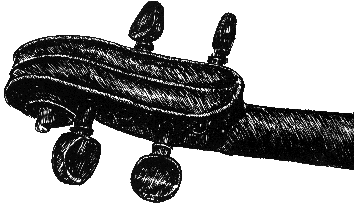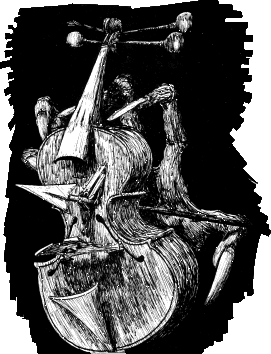 |
The music society meets every Monday at 4 p.m. At last the members are getting their first
taste of orchestral playing, this activity being highly beneficial to those learning to become
competent musicians. We are all practising hard for our first concert, which should take place
later in the year. Doubtless, after our first performance, new recruits to the society will
quickly sign on, and before they know it, they too will be keeping good time and rhythm. The
hidden musical talents of the lower school will come to the surface.
|
|
Of course, there would be no music society at all in the school if it were not for the untiring
efforts of our teachers, who often travel miles to be with us. Mr. Byrne, whose inexhaustible
energy has made the society possible, is especially thanked. In writing this, I am faced with two problems, the main one being that whatever I write now will (by the time this magazine is published) be rather out of date. The second problem is what sort of music to write about. My personal liking is "progressive blues", but if I don't include here something about "reggae", (music to shave heads by) the skinhead faction will no doubt don their "bovver" boots, and start hunting me. For this reason I will now attempt to enlighten you on the subject of reggae. The way in which it originated is debatable, but my theory is that it stems from calypso. Some people will disagree with me here, since before reggae became "in", we had other very similar forms of this type of music, such as Ska, Rock Steady, Bluebeat, etc. but to my mind these in turn are all members of the calypso family. It is only during the last year or so that reggae has suffered a boom. I say suffered, because the gain in support for this music has meant that many singers and groups with a minimum of talent have been: cashing in on it. This has caused a deterioration in the quality of reggae, which has not been very high at the best of times. Reggae is commonly accepted to be the music of the skinheads. The most notable performers of this year have been Desmond Dekkar, Derrick Morgan, The Upsetters, The Pioneers, Dandy, and Harry J. and the Allstars. Now, with a quick change of scene, I will go on to blues and progressive music, which has been largely associated with the hippies, but is now rapidly becoming more of a majority taste; notable progressive bands of the last year were Blodwyn Pig, Edgar Broughton, Colloseum, Ten Years After, Third Ear Band, Chicago, Soft Machine, Led Zeppelin, and the respective bands of Captain Beefheart and Frank Zappa. The standard of musicianship here tends to be far above that of reggae and pop, with the exception of the inevitable groups who hang onto any scene which Is experiencing a period of popularity. Like reggae, progressive music does not often succeed with regard to the hit parade, but I think that this is mainly due to the fact that few progressive groups release singles, for the simple reason that an L.P. will allow you to make a more accurate estimate of a group's ability.
|
|
|
I foresee in months to come a big swing away from the usual commercial rubbish, of which the
charts consist almost entirely at present, towards both reggae and progressive music. Indeed,
I hope this will occur, since it could well improve the standard of material broadcast by
"wonderful Radio One." This of course depends greatly on the programme producer, as well as
the record producers. The charts are much influenced by the number of "plays" a record is given
on the B.B.C., and there seems to have been a definite swing towards the playing of more
progressive sounds in recent months So, with luck, and if producers are concerned about the good of music rather than their pocket, the standards and quality of the music of the students should show rapid improvement - for both skinheads and hairies.
|
 |
| | 1970 Magazine Index | HOME | | |